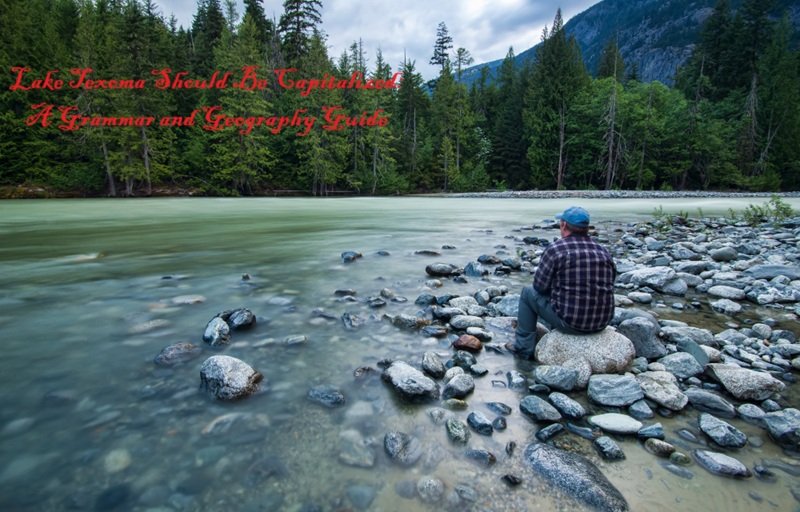When writing about popular locations or landmarks in the United States, it’s essential to use accurate capitalization and formatting. One common question writers and college students frequently ask is: “Lake Texoma Should Be Capitalized?” The quick and easy solution is yes, Lake Texoma ought to always be capitalized. Let’s discover why that’s the case, at the side of some insights into the grammar policies and the charming background of this famous lake.
Why Lake Texoma Should Be Capitalized
“Lake Texoma” is a proper noun, which means it refers to a specific name of a unique area. In English grammar, proper nouns are constantly capitalized because they identify a specific individual, area, or factor in preference to a trendy class.
For instance:
- ✅ Correct: I spent my summer vacation at Lake Texoma.
- ❌ Incorrect: I spent my summer holiday at Lake Texoma.
Just as we capitalize names like Mount Everest, Lake Superior, or Grand Canyon, the call Lake Texoma merits equal treatment. The word “Lake” is a part of the respectable name, no longer just a description, so both phrases should start with capital letters.
Breaking Down the Grammar Rule
To understand why “Lake Texoma” has to be capitalized, let’s have a look at how English grammar treats geographical names.
1. Proper Nouns and Proper Adjectives
Proper nouns — like “Lake Texoma,” “Texas,” or “Oklahoma” — call a particular entity and consequently are continually capitalized.
Proper adjectives, derived from proper nouns (like Texan or Oklahoman), also are capitalized.
2. Capitalizing the Word “Lake”
When “lake” is used as a part of the respectable name, it is capitalized.
Examples:
- Lake Michigan
- Lake Tahoe
- Lake Texoma
However, in case you are referring to a lake in preference, without naming it, you do not capitalize it:
- “We visited a beautiful lake closing the weekend.”
- “We are making plans for a trip to Lake Texoma next summer.”
3. Consistency in Writing
Capitalizing geographical names efficaciously shows attention to detail and respect for the location’s identity. In professional writing, tourism articles, or school essays, incorrect capitalization can make the textual content appear careless or unpolished.
About Lake Texoma: A Quick Overview
Now that we’ve covered why the call must be capitalized, let’s take a brief observation of what makes Lake Texoma so unique.
Location
Lake Texoma is located on the border between Texas and Oklahoma, that’s in which its name comes from (“Tex” from Texas and “Oma” from Oklahoma). It’s one of the largest reservoirs within the United States, created by the Denison Dam on the Red River.
History
Constructed in 1944 by way of the U.S. Army Corps of Engineers, Lake Texoma changed into constructed for flood control, water delivery, and hydroelectric power generation. Over the years, it has come to be a primary exercise hub and a tourist destination.
Recreation and Tourism
Today, Lake Texoma is famous for:
- Fishing: Known as the “Striper Capital of the World” due to its plentiful striped bass population.
- Boating and Sailing: The lake’s large length and scenic views make it best for water sports activities.
- Camping and Hiking: There are several parks and marinas around the lake, which include Eisenhower State Park and Lake Texoma State Park.
- Tourism: Visitors from Texas, Oklahoma, and across the U.S. Flock to Lake Texoma for family vacations, weekend getaways, and outdoor adventures.
Examples of Proper Usage
To help you remember the correct capitalization, here are a few examples:
| Correct Usage | Incorrect Usage |
|---|---|
| Lake Texoma is one of the largest man-made lakes in the U.S. | Lake Texoma is one of the largest man-made lakes in the U.S. |
| I booked a cabin near Lake Texoma for the weekend. | I booked a cabin near Lake Texoma for the weekend. |
| The fishing tournaments at Lake Texoma attract many visitors. | The fishing tournaments at Lake Texoma attract many visitors. |
As shown above, both “Lake” and “Texoma” should always start with capital letters.
Common Mistakes to Avoid
Even though it would appear to be a small element, capitalization mistakes can alter the tone and professionalism of your writing. Here are a few commonplace errors to avoid:
- Writing “Lake Texoma” – Only the second word is capitalized (incorrect).
- Writing “Lake Texoma” – Only the first word is capitalized (wrong).
- Writing “Lake Texoma” – Neither word is capitalized (wrong).
- ✅ Correct shape: Lake Texoma – Both phrases capitalized.
Remember, whilst doubtful, capitalize both phrases within the call of a specific landmark.
The Importance of Proper Capitalization
Correct capitalization isn’t pretty much following grammar rules—it’s additionally approximately clarity and respect for names, places, and people. Using “Lake Texoma” properly shows that you recognize it as a unique and crucial region. Whether you’re writing a weblog, a tour manual, or a social media post, this small element helps you seem knowledgeable and credible.
Conclusion
To sum up, Lake Texoma must continually be capitalized because it is a proper noun regarding a specific geographical region. Both “Lake” and “Texoma” are imperative parts of its name. Whether you’re writing an essay, article, or travel description, don’t forget to capitalize both phrases for accuracy and professionalism.
Correct instance: ✅ Lake Texoma is a lovely destination for fishing and boating fans.
So, the following time you write approximately this scenic lake at the Texas-Oklahoma border, make sure you supply it the right grammatical respect it merits — by means of capitalizing Lake Texoma.
